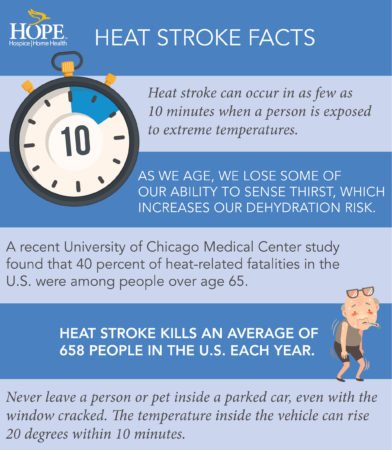
It is very important to be educated on the importance of seniors and hot-weather safety. Too much heat is unsafe for everyone. It is even riskier for those who are over age 65 or who have health problems, as these groups generally do not adjust to major temperature fluctuations as fast as younger people. According to the National Center for Environmental Health, more Americans die from over-exposure to hot weather than by any other natural disaster.
Being hot for too long can cause several illnesses, all grouped under the name hyperthermia. Hyperthermia occurs when there is an unusual increase in core body temperature, and the body cannot release enough heat to normalize itself.
Heatstroke is the most serious heat-related illness. When a person is experiencing heatstroke, the body is unable to control its rising temperature through sweating. Heatstroke can cause death or permanent disability if emergency treatment is not provided; therefore, it is important to know the warning signs:

These are signs of a life-threatening emergency when it comes to seniors and hot-weather safety. Have someone call 9-1-1 while you attend to the afflicted person. Move him or her to a shaded or air-conditioned area and immerse in cool water. Depending on your location, opt for a cold bath or shower, sponge bathe with cold water, or place cold compresses on the neck, armpits, and body. If the person is conscious and able to swallow, give cool water or nonalcoholic, decaffeinated beverages.
Heat-induced illness can cause a person to become confused or lose consciousness, so people who are age 65 or older should have someone check on them twice a day during a heat wave.
Be proactive and have a plan set up before the need arises. You might organize a phone tree or find out if local churches or senior groups have volunteers who can help. A local senior center, library, or other community venues may offer its building as an air-conditioned “cooling zone” open to the public during a heatwave; this can be a great resource for seniors who do not have air-conditioning in their homes or choose not to use it because of the operating cost.
